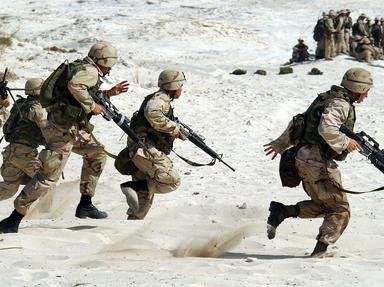Quiz Answer Key and Fun Facts
1. The Vietnam War ended, at least for Americans, on what April date?
2. One of the U.S. allies during World War II was the Soviet Union (Russia). This war was known by another name to the people of that country. How did they refer to this terrible conflict that invaded their homeland, killed their citizenry and soldiers alike, and took such a toll on their impoverished nation?
3. "Operation Urgent Fury" was launched against the tiny country of Grenada in the Caribbean in 1983. What was the *immediate* cause that prompted the U.S. government to take this response?
4. Dateline Afghanistan:
The Soviet War in Afghanistan was a ten-year conflict involving the Soviet Union in their support of the Democratic Republic of Afghanistan at that country's own request. Despite the misleading name "Democratic", this was in actuality a Marxist form of government.
The Islamist Mujahadeen Resistance was their opponent. What is the one of the ironies of this situation, in view of later developments in Afghanistan?
5. This war was a direct result of the artificial political division of this country by agreement of the victorious Allies at the conclusion of the Pacific War during WW2. What Pacific Rim country found itself chopped into two parts as a result of this political maneuvering on the part of other nations?
6. The Korean conflict was not the only war to be started as a direct or indirect result of previous "war victors" decisions. For example, many circumstances entered into Germany's decision to retaliate for perceived injustices incurred during the First World War. These decisions made by Britain and France were designed to weaken Germany at the signing of the Treaty of Versailles had a bearing on future events.
While it would be overly simplistic in the extreme to blame the entirety of World War Two on that treaty alone, where specifically did the signing of the Treaty of Versailles take place?
7. How many times during the years 1900 and 2000 was the U.S. directly involved in military operations in the Central American nation of Nicaragua?
8. While the Nazis during WW2 were not known for their acts of kindness toward POWs, American POWs in Japanese hands fared much, much worse. What was the name of the camp on the Bataan peninsula in the Philippines that awaited the survivors of the infamous Bataan Death March?
9. Seldom do we associate the beauty of poetry with the ugliness of war. In what western European country do the Flanders fields lie?
10. When the Italian dictator, Benito Mussolini was finally captured by his countrymen, how many people were shot, and then later hanged with him?
Source: Author
logcrawler
This quiz was reviewed by FunTrivia editor
bloomsby before going online.
Any errors found in FunTrivia content are routinely corrected through our feedback system.

